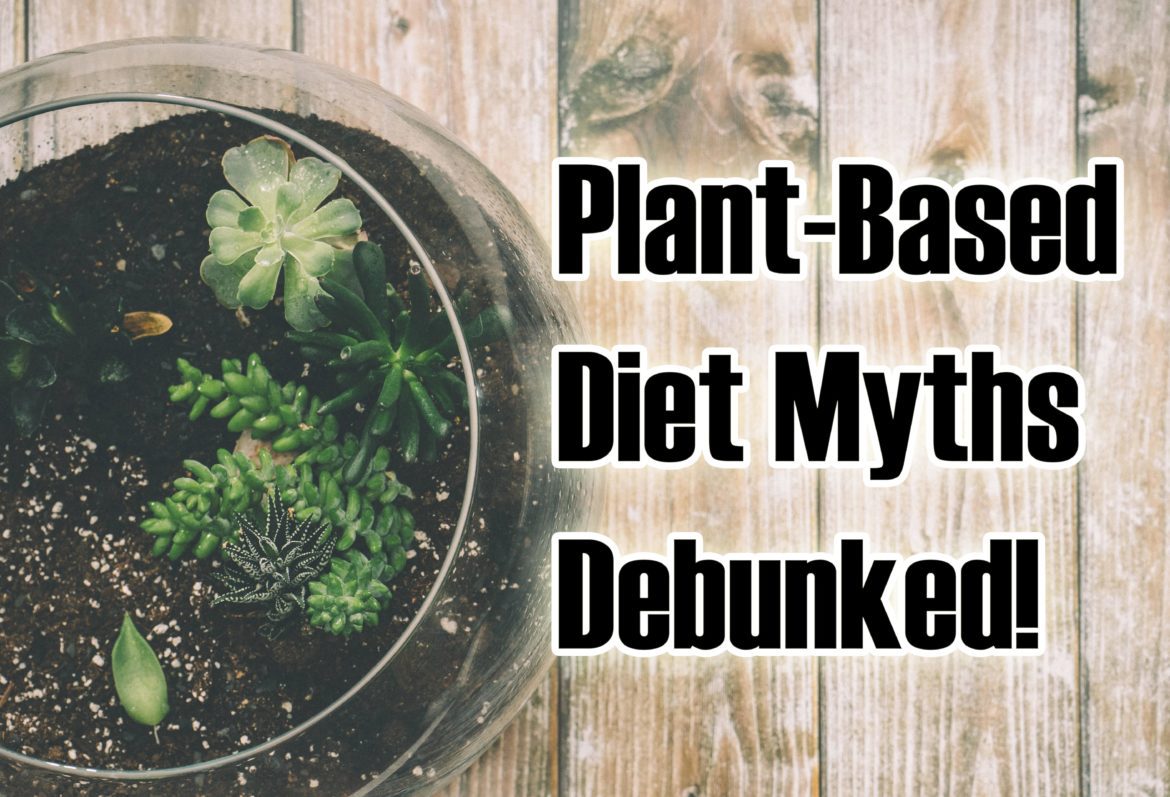Top 10 Plant-Based Diet Myths Debunked!
These are the top 10 plant-based diet myths debunked that we thought you should be aware of if you are thinking of becoming plant-based. We tend to hear these myths over and over again and thought we should share this information if you are thinking of going on a plant-based diet.
We hope these can help put some rest to these silly myths!
Enjoy 😀
Myth #1: Plant-based food is expensive!
Not True! It is the same or even cheaper to eat plant-based than to eat meat!
Dirty Dozen (Highly Sprayed Food – Try to get Organic, if possible): https://www.ewg.org/foodnews/dirty_dozen_list.php
Clean 15: https://www.ewg.org/foodnews/clean_fifteen_list.php
Myth #2: Plant-Based Diet Have a Protein Deficiency.
Weight in kg x 0.8 = Average Daily Protein Need
An adult male who weighs 80 kg (176 lbs) needs about 64 g of protein each day.
An adult female who weighs 65 kg (143 lbs) needs about 52 g of protein each day.
The following groups have different protein needs than what is recommended above:
- children
- pregnant and breastfeeding women
- some athletes
Talk to a registered dietitian to help determine the amount of protein that’s right for you.
(Source: https://www.healthlinkbc.ca/healthy-eating/quick-nutrition-check-protein)
Plant-Based Protein Examples
- 1 cup black beans – 15g
- 1 tbsp Peanut Butter – 4g
- 2 slice bread – 8g
- 1 cup lentils – 18g
- 1 cup quinoa – 8g
- 3 oz Seitan – 21 g
- 1 cup rice – 6g
- 4 oz tofu – 9g
Bio Availability of Protein: how much of the protein is absorbed into the body
Meat has better bio availability protein by only 1-3% more than plants. So you can get all your protein from plants no problem!
Myth #3: You can’t get enough B12 without eating animal products!
Vesanto Melina, RD and co-author of “Becoming Vegan”:
B12 originates from bacteria, not animal products. The reason this nutrient cannot be obtained from plant-foods is because of our sanitary methods of food production. In contrast, meat eaters obtain vitamin B12 that is produced by bacteria present in the flesh of the animals. This lack in sanitary plant foods does not mean that all vegans are deficient in this nutrient, because they can easily obtain the recommended levels of B12 via foods that are fortified with B12 (non-dairy milks, soyfoods, veggie “meats” and breakfast cereals) or via B12 supplements. In fact, all people over the age of 50, on any diet, are advised to use fortified foods or supplements as their B12 sources, as these forms are better absorbed by many seniors than the B12 from animal products. Many seniors develop deficiency of vitamin B12 due to diminished intestinal absorption. Like people on any diet, vegans simply need to make sure they have a reliable source of this essential nutrient.
(Source: http://becomingvegan.ca)
Myth #4: Plant-Based Diets Are Not Suitable for Children!
Is it safe for children to be vegans?
A well-planned vegan diet can be healthy for children. Talk to your doctor or a registered dietitian. Young vegan children tend to be slightly smaller but still within normal growth ranges. And they tend to catch up to other children in size as they get older.
Also, listen to our podcast with Anna Pippus about raising children plant-based: EP11 – RAISING PLANT-BASED CHILDREN WITH ANNA PIPPUS
Myth #5: Plant-Based Diets Make You Weak!
Professional Athletes are preforming the same or even better than meat eaters. Faster recovery and tend to absorb nutrients better as processing meat is hard on the digestion system.
Examples:
Jon Venus: https://www.youtube.com/user/TheQuestForFitness
Simnett Nutrition: https://www.youtube.com/channel/UCpyhJZhJQWKDdJCR07jPY-Q
Myth #6: Plant-Based Diets Are Boring!
Check out our blog or instagram…Doesn’t look boring to us! You defiantly eat more different things then just meat and cheese all the time.
Myth #7: You can’t get enough Iron on a Plant-Based Diets!
Tips:
- Cook with a cast Iron Pan
- Dried Fruits
- Some of the best plant sources of iron include:
- Legumes: lentils, soybeans, tofu, tempeh, lima beans.
- Grains: quinoa, fortified cereals, brown rice, oatmeal.
- Nuts and seeds: pumpkin, squash, pine, pistachio, sunflower, cashews, unhulled sesame.
- Vegetables: tomato sauce, swiss chard, collard greens,
It’s not how much iron you consume, but how well you absorb it.
Eat Iron Rich Plant-based foods with vitamin C foods, and absorption can increase as much as five times!
Myth #8: Vegans Are Elitist!
- Vegans don’t eat animals precisely because they do not think they are superior to any other living being.
- Care about the environment and want to do something about it.
Myth #9: You Can’t Get Enough Omega 3’s Without Consuming Fish!
Ginny Messina, MPH, RD and co-author of “Vegan for Life”: Vegans aren’t at higher risk for heart disease than people who eat fish, but many experts suggest erring on the side of a little insurance by supplementing, especially for those who suffer from depression. Vegans who want to include DHA and EPA in their diets can get it the same way fish do, which is from algae. In fact, from an environmental perspective, it makes sense for everyone to choose algae-derived supplements over fish oil.
(Source: http://www.theveganrd.com)
Myth #10: You need to consume soy to meet nutritional needs on a Plant-Based Diet.
Being soy intolerant I can tell you that you don’t need soy to meet your nutritional needs on a plant-based diet. There is an assortment of different foods you can eat to be able to meet your nutritional needs. Try eating different legumes and grains and try to stick to a Whole Foods Plant-Based Diet!
If you are not sure about your nutritional needs try using Cronometer to see what nutrients you get in a day! It is a free app that helps you keep track of micro nutrients 😀
Cronometer: https://cronometer.com/
Make sure to listen to our podcast on these plant-based diet myths debunked: EP 14 – PLANT-BASED DIET MYTHS

